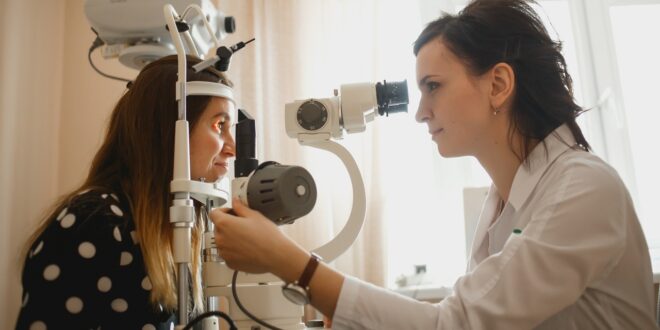Something Was Wrong
I knew something was wrong when I picked her up from the airport. She looked frail as she pointed to her luggage on the conveyer belt. As I pulled each piece off the belt I noticed the sparkle had gone from her eyes. Even her smile looked thin and fragile. Feeling troubled, I reasoned that she is wrestling with the recent loss of her husband, my father, but I learned it wasn’t that at all.
A few days later, she confessed, “I have fallen a few times in the past couple of months. I just fell last week and have a bruise the size of a grapefruit.”
“Why are you falling?” I asked.
She said, “I can’t see too well. I see spots and dark shapes in my vision and everything looks blurred. And I don’t see the curb or the cracks in the sidewalk and I stumble and fall.”
Suddenly, I felt as though my mind had been given a load of bricks to bear. And then the questions started. Is she losing her vision? How will she survive these problems? What can I do to help her? As my mind started to work on solutions, I reassured her, “We are going to do something about it!”
God blessed us by reminding me of an ophthalmologist I knew from my past. Dr. Reginald Sampson was kind, helpful, and quick to identify and assist my Mom with her health needs. He was able to perform surgery and save part of her vision. He, along with a few other doctors, helped relieve problems with glaucoma, cataracts, and bleeding within her eye or “mini-strokes,” they called them—due to uncontrolled high blood pressure.
Financial Struggles
We are thankful and blessed that she is alive and can still see. We also realized that financially, our problems had just begun. My Mom is retired and has private insurance in lieu of public insurance from providers based in New York. They offer limited coverage for an array of care only if it is in New York. Medical care outside of New York is not covered unless it is an emergency. Since she was out of state, and technically her vision was not an emergency, we are left to struggle with a financial solution or pay the bill out of our pockets.
We are not alone in struggling with how to pay medical bills. The number of retired seniors has grown from 3.1 million in 1900 to 33.2 million in 1994. This number is expected to more than double by 2050.1 Many among this group struggle to make ends meet with a limited income.
How much do they pay for health care? Those under 65 years old spend about 4% of their budget on health care but those over 65 spend about 11%.2 For those who may have multiple health problems or chronic health issues, the cost may be higher.
Health Care Challenges
For some, the health care that is needed may not be an option because they cannot afford to pay. How so? Some do not qualify for our country’s healthcare. In my Mom’s case, six months prior to her health challenges, she decided that health care was too expensive when she received a bill for routine tests prescribed by her doctor—an amount that the insurance would not pay. She stopped going to the doctor because the additional health care cost was more than her budget. Many others make these same decisions due to the unexpected costs of health care.
Not only are the added health expenses daunting, but navigating through the system is tough. Who should we call to determine if insurance covers a procedure? Where can we find reliable information? Should we accept a verbal response from insurance companies or get it in writing? And how do we go about choosing doctors for procedures? It took us three months of making several phone calls, searching on the internet, and writing a letter or two, before we finally found out how to handle our situation. For someone who is nearly 80 years old, making sense of our healthcare system can be overwhelming.
What I’ve Learned from This Experience
Learn about the health care system and health insurance before an emergency arises. There is a reason why the health care system is called a system. It is complex and hard to navigate. Finding the right doctors, clinics, and hospitals is quite difficult while trying to make financial and health decisions. When my Mom experienced her mini-stroke, I was able to call the doctor right away and get help. I learned that it is worth investigating and knowing what your doctor(s) or HMO can and cannot do. Identify the fastest route to the nearest hospital. Learn as much as possible about the system so if an emergency arises, you are better equipped to respond.
Set aside an emergency fund to help ease the stress of paying for unplanned expenses. Our system is filled with deductibles, services that are not covered by insurance, expensive medication, and other hidden costs we must shoulder. Having a little extra money set aside helped me pay for one of the doctor’s visits who did not want to wait until my Mom’s insurance was cleared. I learned that I would be better prepared if I always have funds set aside just for this purpose. Perhaps family members can each put aside funds to help each other or a parent during an emergency.
God Made a Way
Life is filled with unexpected twists and turns and health emergencies are no different. As I worked with my Mom, God reminded me that I can do all things through Christ who strengthens me.3 He also reminded me that He would cover me with His feathers and under His wings, I could take refuge; and when I called on Him, He would answer and be with me in trouble.4 God covered my Mom and me with His blessing and calmed our fears. He walked with us and made a way through the difficult. I learned God gives us so many promises and having them in our minds and hearts can make all the difference during a time such as this.
One last comment. I believe it is important to learn about my family’s health problems. I now understand that. Although I do not have glaucoma, I am at risk since my mother and father struggled with it. I can have my eyes checked regularly now to make sure they are healthy. And if I have a problem, I know I can better navigate the health care system because I am prepared.
If you liked this, you might also like When in Pain
Pamela Williams writes from Southern California.
1The US Healthcare System: Best in the World, or Just the Most Expensive? http://dll.umaine.edu/ble/U.S.%20HCweb.pdf Accessed on October 9, 2007.
2Wright, Sandy. Making Sense of Elderly Health Care. "http://www.uwsp.edu/business/cwerb/3rdQtr95/SpecialReportQtr3_95.htm accessed on Oct 11, 2007.
3Philippians 4:13
4Excerpts from Psalms 91:1,4,15
 Answers for Me Support & encouragement for every-day life
Answers for Me Support & encouragement for every-day life



